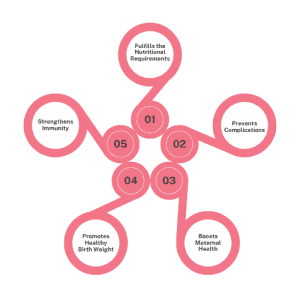Pregnancy is a phase of immense transformation and joy. This phase of transformation involves significant lifestyle changes to changes in dietary habits. Along with the transformation comes changes in the body’s diet requirements. The body’s needs for macronutrients (protein carbohydrates and fats), micronutrients (vitamins minerals) and other elements change during this phase.
There have always been misconceptions regarding diet. Especially during pregnancy, people tend to eat more and begin to avoid certain foods but none of these are accurate. All it requires is adopting a healthy eating routine. A balanced diet during pregnancy ensures adequate nutrition is available for the mother-to-be and the baby. The diet plan encourages the consumption of complex carbohydrates, healthy fats, and proteins from all food groups. During pregnancy the body’s requirement of calories and nutrients increases, the key is to compensate for the additional requirement through diet.
It is important to maintain a healthy diet throughout life but it is especially important during pregnancy. The body undergoes numerous physical and hormonal changes during the pregnancy phase. Since the baby’s primary source of nutrition is the food the mother eats, a balanced diet guarantees that both the mother and the child have access to enough nutrition. The key is to include foods from all food groups in order to meet the increasing nutritional requirements.
During pregnancy it does not require eating for two to fulfil the nutritional requirement, all it requires is eating more nutrient-rich food. During pregnancy, it is more about quality over quantity. Nutrient-rich food to be consumed during pregnancy includes,
Table of Contents
During pregnancy, certain foods should be avoided or only consumed in moderation to avoid complications given the nature of such food. As the body’s immunity decreases during pregnancy, usually food that increases the risk of infection should be avoided. Here’s what not to eat during pregnancy,
Raw eggs, soft cheese, processed foods alcohol, excessive caffeine and unpasteurized dairy products are other foods to be avoided during pregnancy.
Diet plays a very important role in the overall well-being of the baby and the mother. Nutritional needs rise during pregnancy and are met by eating foods that are high in nutrients. The food the mother eats is the source of nourishment for the baby. To maintain a healthy pregnancy around 300 extra calories are required every day and it must be acquired from a balanced diet. The importance of a healthy diet during pregnancy ensures,

| Category | What to Eat | What to Avoid |
| Fruits & Vegetables | Apples, oranges, spinach, carrots, broccoli | Unwashed fruits & vegetables or raw produce |
| Whole Grains | Brown rice, oats, whole-grain bread, quinoa | Refined grains like white bread, sugary cereals |
| Protein | Eggs, lean meat, chicken, beans, lentils, tofu | Raw or undercooked meat, sushi, raw eggs |
| Dairy Products | Milk, yoghurt, pasteurized cheese | Unpasteurized milk or soft cheeses (brie, feta) |
| Healthy Fats | Avocado, nuts, seeds, salmon (low-mercury) | High-mercury fish/seafood |
| Iron-Rich Foods | Spinach, lean red meat, beans, fortified cereals | Excess tea or coffee with meals |
| Snacks | Healthy snacks like nuts, fruits, or yogurt | Processed/junk foods (chips, candy) |
| Hydration | Water (8–10 cups) & hydrating fruits | Sugary sodas or excess caffeine |
Pregnancy is a journey of new experiences. During pregnancy, the body goes through a lot of changes and to support these changes a healthy diet plays a key role. A healthy diet plays a crucial role in the development of the baby while maintaining the mother’s health and ensuring a safe and healthy pregnancy. There are various factors that affect the formation of a pregnancy diet chart including, pre-pregnancy health and weight, medical conditions, lifestyle and activity levels. Thus, it is best to get customised guidance on diet plans to ensure a healthy pregnancy.
A balanced diet guarantees that both the mother and the child have access to enough nutrition. The key is to include foods from all food groups in order to meet the increasing nutritional requirements that ensure the baby’s growth.
Vegetables like broccoli, beets, spinach, etc. are a good source of vitamins and minerals and are good for pregnancy. Ensure the vegetables are washed properly before consuming them.
Yes, coffee/tea can be consumed during pregnancy but in moderation. The caffeine intake should not exceed 200 mg/day.
Whole fruits like apples, berries, avocados, kiwis, bananas, etc. are all good for consumption during pregnancy.
Yes, a pregnancy diet helps provide the required nutrition adequately and leads to a healthy pregnancy.